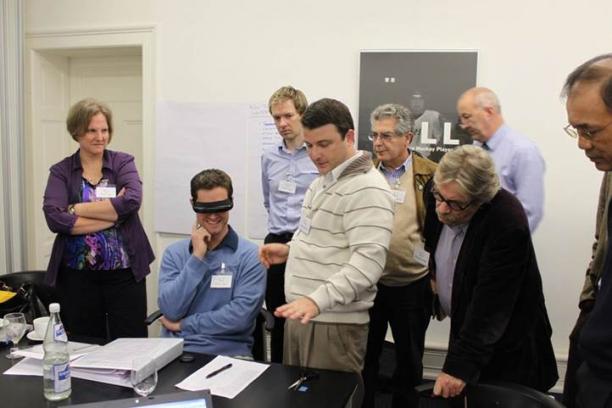No. 24: Classification research to make para-sport stronger
08.12.2013New IPC Classification Research and Development Centres will help the Paralympic Movement extend its knowledge in sport-specific classification.
 Classification experts discuss the future of visually impaired athletes and new research methods.
© • IPC
Classification experts discuss the future of visually impaired athletes and new research methods.
© • IPC
- Related Features
- No. 26: Russian sitting volleyball squad surprises
“The research findings will help create fairer competitions and reduce any vague areas of the sport-specific classification system.”
The International Paralympic Committee (IPC) made great strides in classification research during 2013, as the first of two IPC Classification Research and Development Centres opened in Australia and the Netherlands.
Three centres are being opened around the world to spearhead the co-ordination of the classification research agenda in the Paralympic Movement, with each centre being dedicated to one particular impairment type – physical, visual and intellectual.
"Evidence-based decision-making is critical because it can reduce the number of classification controversies and increase the level of certainty about classification decisions,” said IPC Classification Committee member Dr. Sean Tweedy. “This keeps the focus of the media and fans exactly where it should be – on the sport."
The centres are being supported by some of the funds from the renewed IPC-IOC Co-operation Agreement, which was signed in 2012, allowing for each centre to contract a post-doctoral researcher to assist with leading the project.
In July, an agreement was signed with the Vrije Universiteit of Amsterdam, which will lead a project for the development of sport-specific classification for athletes with a visual impairment.
Then in September, a second contract was signed at the University of Queensland in Brisbane, Australia, for a centre that will focus on athletes with a physical impairment and will be led by Tweedy.
Negotiations for a third centre to focus on athletes with intellectual impairment remain ongoing.
Dr. Peter Van de Vliet, IPC Medical and Scientific Director, said: “These centres will serve as places to exchange conceptual ideas, knowledge, experience and expertise in regards to athletes with an impairment.
“The research findings will help create fairer competitions and reduce any vague areas of the sport-specific classification system.”
IPC Classification Code Review
The opening of the IPC Classification Research and Development Centres has been aligned with the IPC Classification Code Review process, which is encouraging all the Paralympic Movement's stakeholders to suggest reasonable amendments to the current Code.
The IPC Classification Code was adopted by the IPC Governing Board in 2007 and provides policies and procedures for Paralympic classification that should be common to all sports and to the Paralympic Games.
The first round of review ran from 1 June - 30 September 2013, and the second round will run the same dates but in 2014.
Following each consultation round, the feedback is being reviewed by the IPC Classification Committee and the IPC Governing Board. Following the first consultative round, a first draft of the modified IPC Classification Code will be circulated to the membership for the second consultation round.
The modified Code will be presented by the IPC Governing Board as a motion at the 2015 IPC General Assembly, and the amendments will take effect within one year of approval.



















